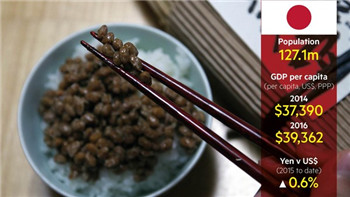(单词翻译:单击)

Dishes which use soyabeans, such as natto, are affected by the rate rise as Japan imports from the US
使用大豆的餐品(例如纳豆)将受到美国加息的影响,因为日本从美国进口大豆
Kinako — a sweet yellow flour used in desserts — is as quintessentially Japanese as food ingredients come, but even this niche product is not immune to economic ripples emanating from the US Federal Reserve.
甜点中使用的黄色的甜甜的粉末“Kinako”,是一种极具日本特色的食品原料,但即便是这种利基产品,也不免要受到美联储(Fed)造成的经济波动的影响。
Yoshio Ogawa, president of 103-year-old Ogawa Industries, makes most of his kinako using soyabeans imported from the US. The dollar exchange rate is crucial to his profitability.
Ogawa Industries是一家有103年历史的日本企业,它生产的“Kinako”基本上都是用从美国进口的大豆制成的。美元汇率对该公司的利润率有着至关重要的影响。
With the yen already trading at about Y124 to the dollar, down more than 50 per cent in the two-and-a-half years since Prime Minister Shinzo Abe came to power, importers such as Mr Ogawa can ill-afford more yen weakness.
安倍晋三(Shinzo Abe)再次出任日本首相至今已有两年半时间,日元兑美元汇率在这段时间里下跌了50%以上,目前为1美元兑124日元左右。像Ogawa这样的进口商可能难以承受日元进一步走弱。
“If we can pass the price rises on then it is fine but the question is whether consumers keep buying,” he says.
Ogawa的社长Yoshio Ogawa说:“如果我们能把价格上涨转嫁出去,那倒还好,可问题是消费者是否还会买。”
Inflation in Japan is still running close to zero, so even if the Fed does not tighten policy in September, at some point there will be a sharp divergence between US and Japanese interest rates.
日本通胀率目前仍接近零,因此,即便美联储没有在9月收紧货币政策,美国和日本的利率也终有一天会出现巨大分化。
Higher US rates make it relatively more attractive to hold dollars. But while a weaker yen hurts importers such as Mr Ogawa by pushing up the price of foreign foodstuffs and energy, it also swells profits at big exporters such as Toyota.
美国加息让持有美元变得相对更具吸引力。然而,尽管日元贬值推高了外国食品和能源的价格、令Ogawa这样的进口商受损,但它也提振了丰田(Toyota)等大型出口商的利润。
The export boost is a stimulus, encouraging Japan’s manufacturers to raise production and investment at home, although big companies have been slow to accept yen weakness is here to stay.
出口增加是一种刺激,它鼓励日本制造商扩大国内生产和投资,尽管日本大企业迟迟未认可日元的弱势将持续下去的观点。
So far the spur to Japanese growth has not been enough to drive up wages. Companies such as Ogawa Industries are left in a bind, because the prices of their inputs have risen but the incomes of their customers have not.
迄今为止,给日本增长带来的提振不足以推升薪资。Ogawa这样的企业正陷入困境,因为它们的投入成本上涨了、顾客的收入却没涨。
That has changed yen politics.
这改变了日元政治学。
Whereas yen weakness got a warm welcome in the early days of Abenomics in 2013, politicians are now much warier, creating a tricky environment for the Bank of Japan to navigate.
2013年安倍经济学(Abenomics)实施初期,日元贬值曾受到热烈欢迎,如今政治人士则变得警惕多了,这为日本央行(Bank of Japan)驾驭现状制造了一个棘手的环境。
Mr Ogawa is doing what he can to prepare for a stronger dollar. But he points out that his room for manoeuvre is limited because customers want non-genetically modified soya. That restricts his choice of suppliers.
Yoshio Ogawa正尽其所能为美元升值做准备。但他指出,他的回旋余地有限,因为顾客们想要非转基因大豆。这对他选择供应商造成了限制。
“One choice is to use more domestic beans,” he says, adding that Japanese produce, however, is not cheap.
他说,“一种选择是更多地使用国内的豆子”,但日本的豆子可不便宜。


